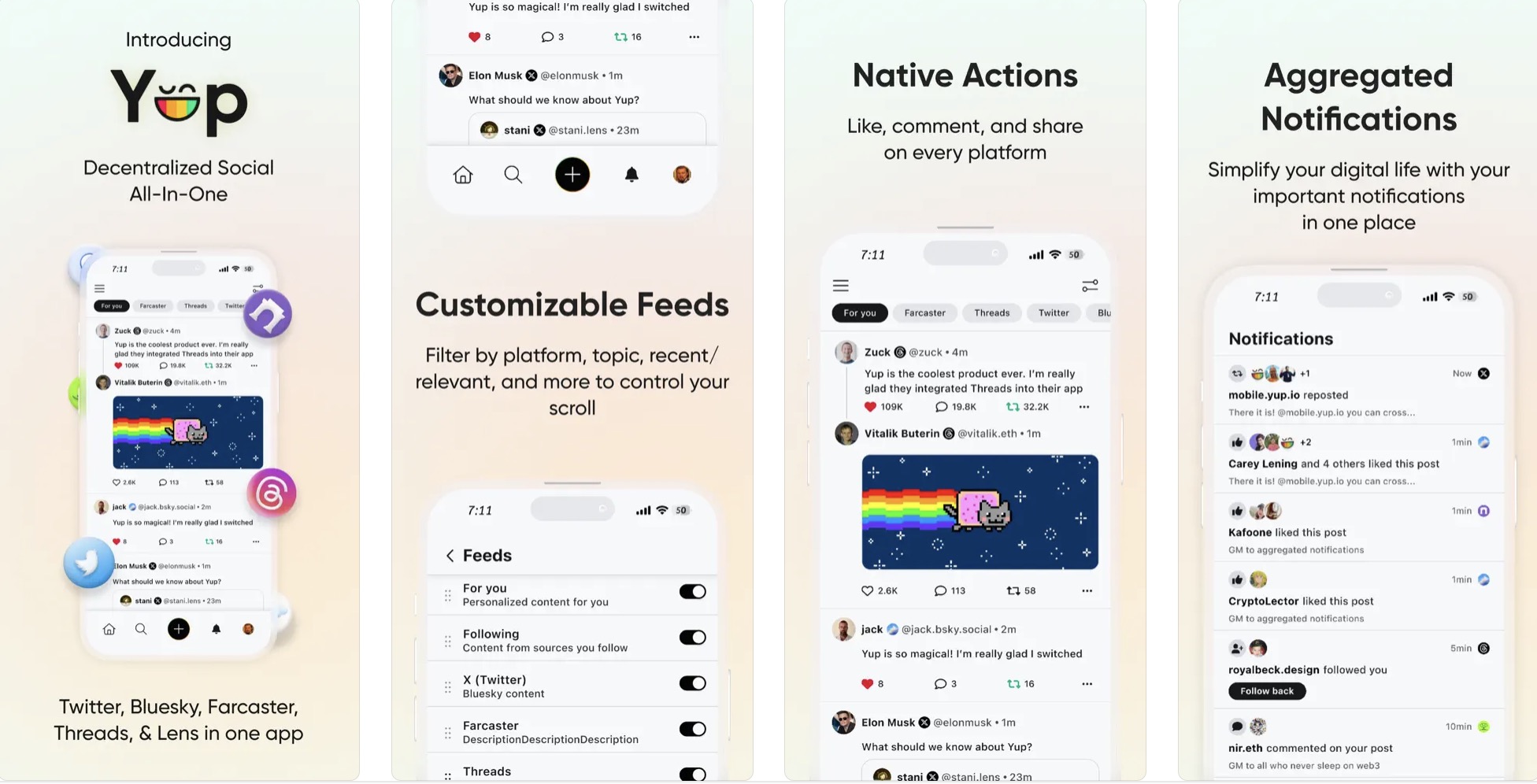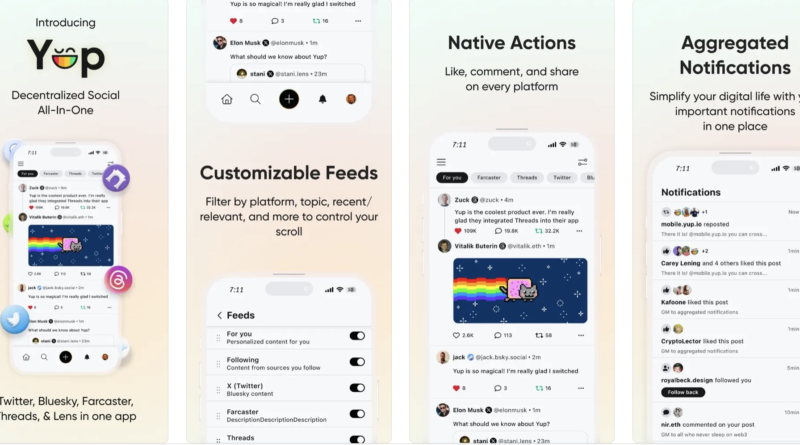Yup hacks together a cross-posting app for X, Threads, Bluesky and others
Decentralized social networking may be the future, but in the meantime, there are a lot of Twitter alternatives to keep up with. A new app called Yup aims to help by offering a single place to read feeds, follow friends across services and cross-post to a range of social apps, including Twitter/X itself, as well as Bluesky, Farcaster, Lens and Threads — although the latter comes with a big caveat.
Instagram head Adam Mosseri announced last month that a Threads API was in the works, which would allow developers to build apps that connect with the Threads ecosystem. However, that API is not yet publicly available, which means Yup has come up with a workaround to support Threads.
The company told TechCrunch the app “informally uses the internal API” that the Threads web client uses, but it plans to migrate to the official API when one is released. Because of this hack of sorts, being able to use Threads via Yup means having to turn off Instagram’s two-factor authentication (2FA) — an additional means of securing your access to the app via a login code sent over text or an authentication app. TechCrunch does not recommend you disable 2FA, even though an app for cross-posting to Threads, Twitter and Bluesky is much in demand.
That said, we still thought it was notable to comment on the launch of Yup, as an example of how fractured the social app ecosystem has become following Elon Musk’s acquisition of Twitter, now called X. In the months since, new Twitter rivals have emerged and grown, including the open source decentralized platform Mastodon and Threads, which promises to integrate with the ActivityPub protocol that powers Mastodon and a wider “fediverse” of decentralized social apps.
But those aren’t the only efforts underway focused on rebuilding the social web. Competing protocols, like the decentralized protocol Farcaster and the web3-powered Lens, are also in the running, as is the AT Protocol from Bluesky.

Image Credits: Yup on App Store
At launch, even Yup itself doesn’t support the full social app ecosystem. Mastodon is notably missing, as is Nostr, the decentralized protocol powering apps like Damus and others, which is favored by Twitter co-founder and former CEO, now Block CEO, Jack Dorsey.
Yup says it’s exploring adding support for those services in the future. But currently, the cross-posting app supports Twitter/X, Bluesky, Farcaster, Threads and Lens.
Yup’s co-founders Nir Kabessa and Vernon Johnson met at Colombia University where they both became involved in the web3 space and open social networks.
“What we realized is one of the advantages of these new open social networks, like Bluesky, is how much they’re interoperable with one another and sort of aggregatable and consolidatable all as a consumer product,” explains Kabessa. “And that not only would that allow users to have a more powerful kind of consolidated experience, where all their friends are in one place, even though these platforms are very new, but it also allows them to establish their social graphs on other platforms and protocols while continuing to use things as they normally do,” he added.
The team believes Yup could serve as a tool that allows consumers and creators to build their audiences across platforms by cross-posting and engaging with open protocols, while still maintaining their presence on larger social apps like Twitter/X.
However, Yup’s support for X requires it to pay $5,000 per month in API fees. The company is funding this expenditure from a $3.5 million seed round it raised a bit under two years ago. That round was led by Distributed Global with Dapper Labs (makers of CryptoKitties) and other angels, including Miramax CEO Bill Block and BitClout founder Nader al-Naji, also participating.
Yup had earlier focused on a different project around ratings and rewards, but pivoted to social app aggregation around a year and a half ago, we’re told.
Although some tools allow consumers to cross-post to multiple social sites, such as Fedica which supports X, Mastodon and Bluesky, among others, there aren’t many cross-posting tools available for both X and Threads and the wider array of decentralized apps that are aimed at consumers. (To be honest, we’re not sure how long Yup will be allowed to operate given its hack for Threads support, but the company noted it had not gotten any pushback from Instagram as of yet. Its app also made it through approvals on both the App Store and Google Play, for what it’s worth.)
As for the Yup app itself, the experience is much as you’d expect. After connecting your accounts, you can toggle on which apps you want to post to from its main “compose” screen.
Yup also supports features like search (for people, posts and bookmarks); notifications from across your apps; and a variety of feeds, including a “For You” feed, a Following feed and those devoted to topics like web3, AI, NFTs, music, podcasts, videos and others. The app offers a custom chronological feed for each platform, as well. In tests, however, we couldn’t get some of these feeds to regularly update, even though we had connected our accounts. For that reason, we can’t recommend Yup as a dedicated browsing app.
There are other areas that will present a challenge for Yup going forward, too — like referencing or quoting posts from one platform to another. More work will need to be done to make this a fully functional app for anything beyond cross-posting, we think.
Still, the fact that such an app like Yup has come into existence at all is an indicator of where we are today with so many competing protocols for a decentralized social web. That doesn’t make things easier for consumers looking to move away from Big Tech companies or for developers — it makes things more fractured and more confusing. A decentralized social web is great in theory but not if there are half a dozen protocols that don’t interoperate. Hopefully, some sort of consensus will eventually be achieved here.
In the meantime, we suppose, there’s Yup.
For now, the app is free to use. A future version may offer a paid subscription to support its costs going forward.




